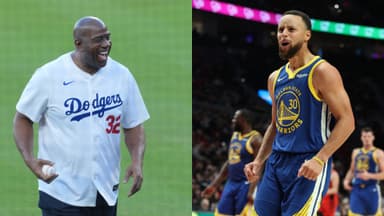Magic Johnson went from being a LA Lakers legend to a global business mogul. The Hall of Famer, along with the showtime Lakers, dazzled the NBA in the 1980s, then rewrote the playbook for life after sports, influencing the likes of LeBron James and Shaquille O’Neal. He went on to build a business empire worth $1.2 billion and has become one of the most successful athlete-turned-entrepreneurs in history.
Advertisement
Johnson retired on November 7, 1991, after a storied 13-year Lakers career that included five NBA championships and three MVP awards. He entered retirement with a $40 million net worth but never rested on his on-court success.
In 1987, Johnson founded Magic Johnson Enterprises (MJE) to empower Black and Latino communities through targeted investments. He called that approach “Magic-izing,” using strategic partnerships, direct investments, and culturally aware marketing as his model.
Johnson launched Magic Johnson Theatres in partnership with Sony Pictures, introducing upscale cinemas to underserved urban areas. Those theaters revitalized neglected neighborhoods while generating strong returns.
That success led Johnson to buy Starbucks franchises—the first athlete to own one. When he sold his 125 locations, he reportedly netted $100 million, marking one of the most successful franchise moves by a pro athlete.
On a recent episode of The Deal on Bloomberg Originals, MLB legend turned businessman Alex Rodriguez and co-host Jason Kelly sat with Johnson at the Milken Global Conference. In front of a live audience, Johnson discussed his toughest business pitch to Starbucks’ board.
When hosts asked about his biggest deal outside sports, Johnson said, “It would have to be Starbucks. Because it gave me the stamp of approval.” He then explained the initial resistance in the boardroom. “A lot of people wanted the meeting for an autograph… then said no, they didn’t want to be in business with me.”
Johnson targeted Starbucks CEO Howard Schultz. Before a Lakers-Supersonics game in Seattle, he walked straight to Schultz courtside. He introduced himself: “Hey, I’m Earvin Johnson.” He asked, “Can I take you to lunch or dinner next time we’re back?” Schultz said yes.
A few weeks later, Johnson showed Schultz revenue numbers from his thriving theaters. “So a few weeks later we went back up there and my movie theaters was crushing it in the inner cities. My theaters were top ten highest-grossing in the nation,” he said.
He also explained how getting into business with him would be beneficial to the brand: “I said the growth of your business would be through urban America because you got one on every corner in suburban America.”
Schultz agreed to explore. However, Johnson faced his biggest challenge going before Starbucks’ board.
He told them, “I thought the hardest thing was playing Larry Bird and Michael Jordan. The hardest thing was to go before the board and then go into a movie theater packed with good shareholders and try to convince them this is a great move for Starbucks. And sure enough, I was able to do that, and they all signed off.”
After his pitch, board members greenlit his proposal. He became the first external Starbucks franchisee. He opened 125 stores across 40 U.S. markets, all of which performed extremely well. That gave him both “the stamp of approval” and a solid track record, paving the way for future deals.
Johnson expanded his portfolio to include stakes in Burger King, Fatburger, TGI Fridays, Best Buy, and 24 Hour Fitness—all focused on providing quality services in historically underserved communities, creating jobs, and generating long-term economic impact.
Johnson returned to sports as an owner. In 1994, he acquired a stake in the Lakers, which has grown in value from $10 million to roughly $260 million. His holdings now include stakes in the Los Angeles Dodgers, Los Angeles Sparks, LAFC, a four percent share of the Washington Commanders, and Team Liquid, one of the world’s top esports teams.
Outside sports and entertainment, Johnson holds a controlling interest in EquiTrust, valued at $6 billion, and a stake in Aspire TV. His ventures span renewable energy, media, and urban real estate. Among projects, he aims to revive downtown Detroit via tech and business investment.
Johnson experienced setbacks, like a failed theater venture in Detroit, but his overall record proves exemplary. He now ranks alongside Michael Jordan, LeBron James, and Tiger Woods as one of only four billionaire athletes in the world.
From captivating fans on the hardwood to building billion-dollar partnerships in the boardroom, Johnson showed that vision, discipline, and resilience can build a legacy far beyond the final buzzer.





